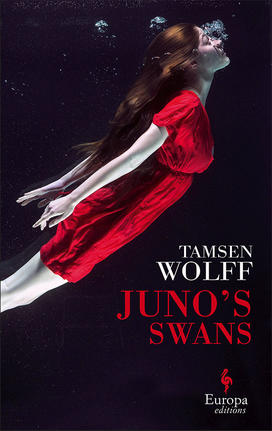Tamsen Wolff Tackles Young Love

Juno’s Swans (Europa Editions) is Tamsen Wolff’s debut novel. It is the story of first love and first heartbreak. It is also the story of young adulthood, female friendship, and the AIDS epidemic.
The author: Tamsen Wolff is an associate professor of English. She graduated with a Ph.D. in theatre and English from Columbia University and has worked as a director and dramaturg. Wolff is the author of Mendel’s Theatre: Heredity, Eugenics, and Early Twentieth-Century Drama.

You can’t be, I said (glossy-eyed, disbelieving, glazed, cracked), you’re for me.
Listen, I like a love story. And this would be a love story except that Sarah wrecked it, just came on in and jumped on its head casually in cleats, so instead I’m rooting around, but I’m not even finding the punctured remains. I know there are countless ways to make an exit, family who leave and friends who turn into strangers. But this. I could not have imagined it. If she hadn’t loved me once maybe she wouldn’t have left me to the dogs, to the wilderness, to my own devices, which as it turns out, all seem to amount to the same thing. Even with everything else that’s happened, I keep circling the loss of her like an animal worrying a wound. I need one of those huge cones they put around dog’s necks to keep them from doing this, from licking the painful place again and again.
(I’m in love with her.)
I want her cleaned out of all the wispy misty corners where she’s hiding. I want her cleaned out of all the places where I tucked her, deep in my pockets, close to my heart, under my entrails for safekeeping. I’m going to have to cut her out like an infection, scoop her out, with a cherry pitter or a grapefruit spoon, the way they used any crude metal implement on the fields of the Civil War to dig out a rotting bullet wound. Clean it out from the beginning, from the start. That’s my plan.
I know this much:
It started at a party in Wellfleet on Cape Cod last spring, not long after my seventeenth birthday.
(And right then, every time, the deafening tidal wave of her voice rears up. I’m in love with her. And the surge of despair pulls me under. You can’t be. You’re for me.)
Round and round it goes, a manical broken record. I don’t know how to look at it and I don’t know how to look away.
How many times can one person break your heart?
Reviews: "With its acutely portrayed psychological depth, a heady summer at its heart, and its focus on a well-worn friendship that becomes uncharted territory when first love enters the picture, Wolff's debut, coming-of-age novel casts a literary spell that recalls the dazzling second book of Elena Ferrante's Neopolitan novels, The Story of a New Name (2013)." — Booklist











No responses yet